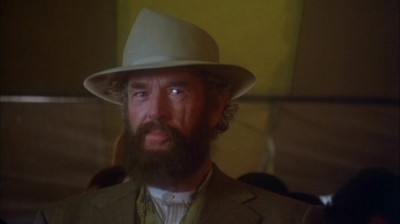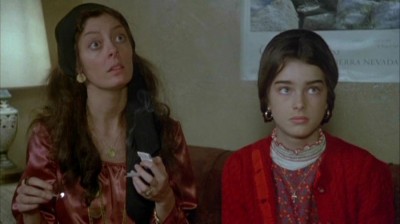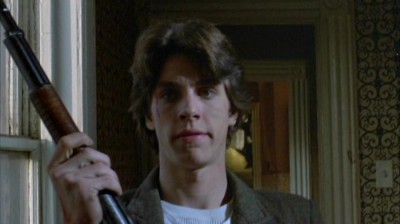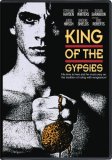| Reviews & Columns |
|
Reviews DVD TV on DVD Blu-ray 4K UHD International DVDs In Theaters Reviews by Studio Video Games Features Collector Series DVDs Easter Egg Database Interviews DVD Talk Radio Feature Articles Columns Anime Talk DVD Savant Horror DVDs The M.O.D. Squad Art House HD Talk Silent DVD
|
DVD Talk Forum |
|
|
| Resources |
|
DVD Price Search Customer Service #'s RCE Info Links |
|
Columns
|
|
|
King Of The Gypsies
In another Legend Films release of a moribund Paramount library title, King of the Gypsies, the 1978 Dino De Laurentiis production starring Eric Roberts, Susan Sarandon, Sterling Hayden and Shelly Winters, comes to video for the first time. And I would suspect, for the last time, as well. Very loosely based on the book by Peter Maas, writer/director Frank Pierson's drama of a gypsy feud in modern-day New York suffers from an unconvincing immersion into this little-explored culture, a cliched, scattershot script, and some curious (to say the least) performances. De Laurentiis tried hard to drumbeat this film into some kind of "event" when it premiered back in '78, but audiences were disinterested and the film has languished in relative obscurity ever since.

Opening in the 1950s, the stage is set for the eventual gypsy feud between Groffo Stepanowicz (Judd Hirsch) and his son, Dave (Eric Roberts). The self-proclaimed "King of the Gypsies," Zharko Stepanowicz (Sterling Hayden) in involved in a dispute with another gypsy tribe. Having paid thousands of dollars for the young girl Rose (who will eventually be played by Susan Sarandon), the father Spiro Giorgio (Michael V. Gazzo) refuses to relinquish her because she hates Groffo (here played as a child by Marc Vahanian). Zharko demands that the tribal elders decide Rose's fate - while denigrating his son whom he sees as weak and unworthy of being the next King of the Gypsies. The elders decide against Zharko, but he steals Rose anyway, and she becomes Groffo's wife.
Zharko proves correct in his assessment of Groffo's abilities (which very likely stemmed from being ill-treated by Zharko), and he instead focuses his attention on Groffo's son, Dave. Rose turns out to be a remarkably successful scammer and cheat, while Groffo is reduced to chauffeuring Rose around, never having developed his skills as a thief. His humiliating position in the family drives the vain, unstable Groffo further into an abusive spiral, eventually forcing young Dave to run away from home. Growing up on the streets, Dave eventually is tracked down by his grandfather, who tells him he has a responsibility to his people - a responsibility that Groffo cannot fulfill. Dave resists this notion (he hates being a gypsy), but events soon conspire to bring him in conflict with his abusive father.
SPOILERS ALERT!
I remember quite a bit of hype over King of the Gypsies (not an unusual occurrence for a Dino De Laurentiis production), but zilch as far as audience interest in the film, and watching this new DVD after not having seen the film in thirty years, it's not hard to see why audiences were nonplused. Marketed as an examination of the gypsy culture, as well as some kind of pretender to the Godfather throne, King of the Gypsies delivers on neither of those two promises. There certainly haven't been very many serious mainstream films that have looked at the gypsy experience in America, so some critics in 1978 were taken with King of the Gypsies' milieu, believing that any film depicting this relatively anonymous group was successful (after tiring of almost a decade of films exploring the criminal aspects of Italian-Americans), regardless of the film's actual worth.

But King of the Gypsies is all surface show when it comes to exploring the gypsy lifestyle - and not even all that well executed surface show, at that. Who are these people? Are we to admire them? Fear them? Dismiss them? Pity them? The film refuses to help us come to any answers because what it shows is filtered through the same fake crap that has marked Hollywood depictions of other "exotic" cultures through the decades. In King of the Gypsies, the gypsies are always dancing. Or singing. Or scamming. Or fighting. But we never get a real sense of who and what they are as a people, as a culture. The only insightful "fact" about the gypsies that's imparted to the audience, over and over again, from King of the Gypsies is that gypsies will always lie, no matter what. That's not what I call a very in-depth examination of a people. Frequently, writer/director Pierson (The Looking Glass War, A Star is Born) resorts to showing the gypsies partying, which I guess is supposed to tell us they love life, but what of it? How does that love of life fit in with their troubled existence, and their life of crime? These showy little bits of cultural business (not particularly well executed, by the way) pale in comparison to the energy and life and emotion and most importantly, information, that director Michael Cimino was able to render in delineating the ethnic-flavored steelworkers' culture from The Deer Hunter, which was released just after King of the Gypsies late in '78. If we're supposed to root for Dave breaking away from his gypsy roots (or indeed, if we're supposed to root for Dave returning to his gypsy roots - the film refuses to take a side), don't we have to know a little bit more about that gypsy life in the first place?
The plotting is rather chaotic and haphazard, as well. For instance, the film begins with Zharko getting slapped down by the tribal elders, telling him to stay out of New York territory and to stop calling himself the King of all the Gypsies. But later, when Zharko reconnects with his grandson, he's...the King of the Gypsies in New York. How did that happen? The film doesn't say, but it's a pretty major plot point, particularly when Zharko is going to hand over the reins of the Kingship to Dave. Unfortunately, that whole aspect of King of the Gypsies, which plays like a sorry retread of disparate Godfather themes, is just as cliched and obvious as the film's efforts to illuminate the gypsy culture. Boiled down to a pat, thoroughly familiar "wise grandfather/stupid, violent son/bright, capable grandson" dynamic, this central plot quickly takes over the film, and becomes a rather rote revenge melodrama, with Groffo trying to kill Dave, and Dave eventually exacting revenge on his abusive father. We've seen all of that many times before, giving King of the Gypsies a B-movie framework that it can't support with enervated direction (Pierson's action scenes are frequently ludicrous, such as when Zharko steals Rose away, or the final shotgun finale with Dave and Groffo) and a weak script.
Not helping matters are some compromised performances. Sterling Hayden is always fun to watch, and he pulls some neat tricks as King Zharko (watch him laugh at the diamond seller's dilemma when Rose steals a gem). But more often than not, Hayden seems to be channeling one of Anthony Quinn's "earthy peasant" performances, by way of Hayden's own, better turn as Roger Wade in Altman's The Long Goodbye. Sarandon is...amusing as Rose (for all the wrong reasons. Start with that accent), while Roberts, in his first starring role, is at times almost unintelligible, either from over-emoting, or faulty elocution lessons (his spoken narration is much better). Hirsch isn't bad as the one-dimensional Groffo, but Shelley Winters (one of my favorite actresses) has to be seen to be believed as Queen Rachel (I suspect her overacted part was pared down to the absolute barest minimum - she's barely here). Annette O'Toole, always smart and lovely, has nothing to do here, either, in a throwaway role as Dave's civilian girlfriend, while Brooke Shields is hopeless at playing his little sister (how hard can it be for a little girl to play a little girl?). Hands down, though, Annie Potts as gypsy temptress Persa (that's right, squeaky little Annie Potts as a gypsy), is the miscasting of the decade. None of these performances come close to smoothing over the rough spots of the direction and script, finally making King of the Gypsies a fairly worthless exercise in faux-exotica.

The DVD:
The Video:
Loving old, forgotten library titles, I'm all for companies like Legend Films contracting with major studios to cheaply release titles that may not otherwise get released. And it's important to remember that despite any drawbacks in video fidelity here, these DVD images still look way better than when these films showed up pan-and-scanned and faded on broadcast TV. That being said, the anamorphically enhanced, 1.85:1 widescreen video transfer for King of the Gypsies is not without its faults. As with other Legend Films library titles, grain is consistent and noticeable, along with scratches and dirt. Colors tend to be dark and muddy, which proves lamentable considering the delicacy of the cinematographer Sven Nykvist's original theatrical palette. The picture is somewhat soft, as well.
The Audio:
And again with the Legend Films library releases I've viewed, the English 2.0 mono soundtrack is all over the place. Dialogue is low and often hard to understand, while the music and sound effects are distressingly loud in comparison - which is actually a plus here, considering the wonderful gypsy music that frequently can be heard drowning out Pierson's challenged dialogue. Close-captions are available.
The Extras:
There are zero extras for this bare-bones release of King of the Gypsies.
Final Thoughts:
Throughout King of the Gypsies, there are frequent shots of a man dancing a gypsy jig. No explanation is given for his actions, his place at several events, or his "significance" to the story. We know he's supposed to be "meaningful," but no one is going to tell us how - or provide the context to let ourselves figure it out. It's just this kind of pretentious nonsense that sinks King of the Gypsies, a punches-pulled non-exploration of the gypsy culture, and a bad Godfather B-movie rip-off, to boot. It's all surface play, with no resonance or understanding. And marginal performances don't help. Rent it if you must for the stars, I suppose, but a general audience will stay away...just like it did thirty years ago.
Paul Mavis is an internationally published film and television historian, a member of the Online Film Critics Society, and the author of The Espionage Filmography.


|
| Popular Reviews |
| Sponsored Links |
|
|
| Sponsored Links |
|
|
| Release List | Reviews | Shop | Newsletter | Forum | DVD Giveaways | Blu-Ray | Advertise |
|
Copyright 2024 DVDTalk.com All Rights Reserved. Legal Info, Privacy Policy, Terms of Use,
Manage Preferences,
Your Privacy Choices | |||||||














